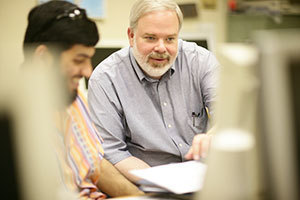
High school teachers and college professors from around the country are gathering at the University of Notre Dame this week (June 24-28) for a five-day workshop on teaching introductory computer programming.
The workshop will employ MATLAB, a programming language widely used in engineering and science. Craig Lent, Notre Dame’s Frank M. Freimann Professor of Electrical Engineering, will lead the workshop, which is based on an approach to teaching first-time programmers that was developed in collaboration with South Bend’s Trinity School at Greenlawn.
The methodology presented at the workshop introduces beginning programmers to the techniques of building so-called GUI Tools — computer programs that include a graphical user interface (GUI, or “gooey”). Students find building GUI Tools, which can include advanced interactive graphics, more rewarding than text-based programming alone. Learning to create and analyze computational models can help them understand the behavior of real-world systems.
“I think an attractive approach to learning how to actually ‘write’ useful programs, not just ‘use’ programs, could be an important element in revitalizing U.S. STEM (science, technology, engineering and mathematics) education,” Lent said.
The GUI Tools approach was created when Lent teamed with Tom Finke and other teachers from Trinity School to develop an appealing way to teach computer programming to high school juniors. Learning MATLAB and applying it in physics and mathematics are now part of the curriculum for all students at Trinity campuses in South Bend, Eagan, Minn., and Falls Church, Va.
“At Trinity Schools, we have been teaching MATLAB programming using the GUI Tools approach to all of our juniors and seniors since 2005,” Kerry Koller, president of Trinity Schools Inc., said. “It brings excitement to their study of mathematics and science, trains them in sophisticated problem-solving skills and equips them to engage science and mathematics seriously throughout their lives.”
As head of science and math for Trinity, Finke sees multiple benefits to programming in high school.
“We’ve been able to study mathematical modeling in biology and ecology as well as in physics,” he said. “Many of our students go into STEM fields in college and they report how well prepared they are. Moreover, even for non-STEM students, the discipline of computer programming can improve their ability to think carefully and logically.”
Notre Dame has been using the GUI Tools approach for all first-year engineering students for the last four years. Lent adapted the technique to the college level to be one part of “Introduction to Engineering Systems,” a two-semester project-based course developed by Jay Brockman, associate dean of engineering for educational programs at Notre Dame.
“The MATLAB GUI Tools approach has proven very effective in teaching students to build useful computational models of engineering systems in a way that’s engaging and fun,” Brockman said. “The graphical elements help in visualizing the model’s performance and are also a great opportunity for students to work on creative design of the interface.”
This week’s workshop is being held in Notre Dame’s Stinson-Remick Hall of Engineering. Admission to the intense workshop was very competitive — there were three times as many applicants as there were available positions. The 22 participants are from public and private schools around the country. Several Trinity teachers with many years of experience are acting as “coaches.”
The workshop is co-sponsored by Notre Dame, Trinity Schools and the National Science Foundation, with additional support from Mathworks and Wiley.
Contact: Craig Lent, 574-631-6992, lent@nd.edu